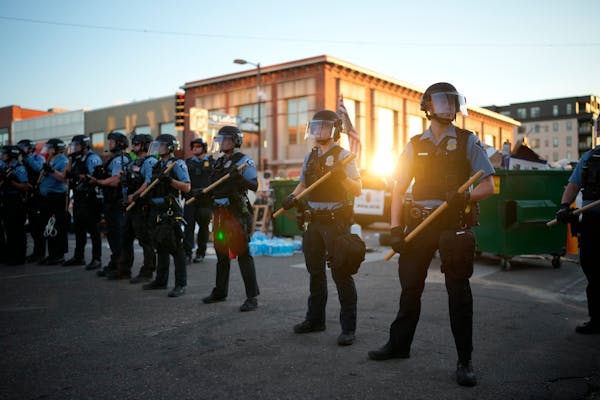About the poll
The findings of this Star Tribune/MPR News/KARE 11/FRONTLINE Minnesota Poll are based on live interviews conducted Sept. 9 to Sept. 13 with 800 Minneapolis registered voters who indicated that they are likely to vote in the November city election. That sample included interviews with 537 self-identified white registered voters and 157 African-American registered voters. During the same period, an additional 343 interviews were conducted with African-American registered voters in Minneapolis who indicated they are likely to vote in November, for a total of 500 interviews. This is commonly referred to as an "oversample," and allows for an apples-to-apples comparison of the responses of white voters and Black voters, with similar margins of sampling error. The findings of this oversample appear under "Black voters" in the data tables, but these additional interviews are otherwise not included among the main sample of 800 Minneapolis registered voters. Other racial demographics are not included in the poll question data tables due to the small number of interviews conducted. This poll was conducted for the Star Tribune, Minnesota Public Radio News, KARE 11 and FRONTLINE, the PBS series, by Mason-Dixon Polling and Strategy Inc.
Those interviewed were randomly selected by computer from a phone-matched Minneapolis voter registration list that included both land line and cellphone numbers. For the sample of 800 Minneapolis registered voters, 30% of the interviews were conducted via land line and 70% via cellphone. For the sample of 500 African-American registered voters, 23% of the interviews were conducted via land line and 77% via cellphone.
The margin of sampling error for the sample of 800 Minneapolis registered voters, according to standards customarily used by statisticians, is no more than ± 3.5 percentage points. This means there is a 95 percent probability that the "true" figure would fall within that range if all voters were surveyed. The margin of sampling error for the sample of 500 African-American Minneapolis registered voters is no more than ± 4.5 percentage points. The margin of error is higher for any subgroup, such as a gender or age grouping.
Sampling error does not take into account other sources of variation inherent in public opinion surveys, such as nonresponse, question wording or context effects. In addition, news events may have affected opinions during the period the poll was taken.
The self-identified party affiliation of the respondents of the sample of 800 Minneapolis registered voters is 65% Democrats, 7% Republicans and 28% independents or other. The self-identified party affiliation of the respondents of the sample of 500 African-American Minneapolis registered voters is 69% Democrats, less than 1% Republicans and 31% independents or other.
The demographic profile of this poll of registered voters is an accurate reflection of their respective voter populations. This determination is based on more than 100 statewide polls conducted by Mason-Dixon in Minnesota over the past 32 years – a period that spans eight presidential election cycles that began in 1988.
Readers can e-mail questions to
matt.delong@startribune.com.
Demographics of Minneapolis voters
| PARTY |
| DFL/Democrat |
519 |
(65%) |
| Republican |
53 |
(7%) |
| Independent/other |
228 |
(28%) |
| AGE |
| 18-34 |
198 |
(25%) |
| 35-49 |
246 |
(31%) |
| 50-64 |
194 |
(24%) |
| 65+ |
155 |
(19%) |
| Refused |
7 |
(1%) |
| RACE |
| White/Caucasian |
537 |
(67%) |
| Black/African American |
157 |
(20%) |
| Hispanic/Latino |
43 |
(5%) |
| Asian/Pacific Islander |
46 |
(6%) |
| Other |
13 |
(2%) |
| Refused |
4 |
(1%) |
| GENDER ID |
| Male |
376 |
(47%) |
| Female |
414 |
(52%) |
| Other |
10 |
(1%) |
| EDUCATION |
| High school or less |
177 |
(22%) |
| Some college/Vocational |
167 |
(21%) |
| College graduate |
273 |
(34%) |
| Graduate degree |
179 |
(22%) |
| Refused |
4 |
(1%) |
| INTERVIEW |
| Landline |
238 |
(30%) |
| Cellphone |
562 |
(70%) |
Demographics of Black Minneapolis voters
| PARTY |
| DFL/Democrat |
343 |
(69%) |
| Republican |
3 |
(1%) |
| Independent/other |
154 |
(31%) |
| AGE |
| 18-34 |
114 |
(23%) |
| 35-49 |
123 |
(25%) |
| 50-64 |
139 |
(28%) |
| 65+ |
118 |
(23%) |
| Refused |
6 |
(1%) |
| GENDER ID |
| Male |
208 |
(42%) |
| Female |
292 |
(58%) |
| Other |
0 |
(0%) |
| EDUCATION |
| High school or less |
221 |
(44%) |
| Some college/Vocational |
174 |
(35%) |
| College graduate |
76 |
(15%) |
| Graduate degree |
27 |
(6%) |
| Refused |
2 |
(<1%) |
| INTERVIEW |
| Land line |
117 |
(23%) |
| Cellphone |
383 |
(77%) |



